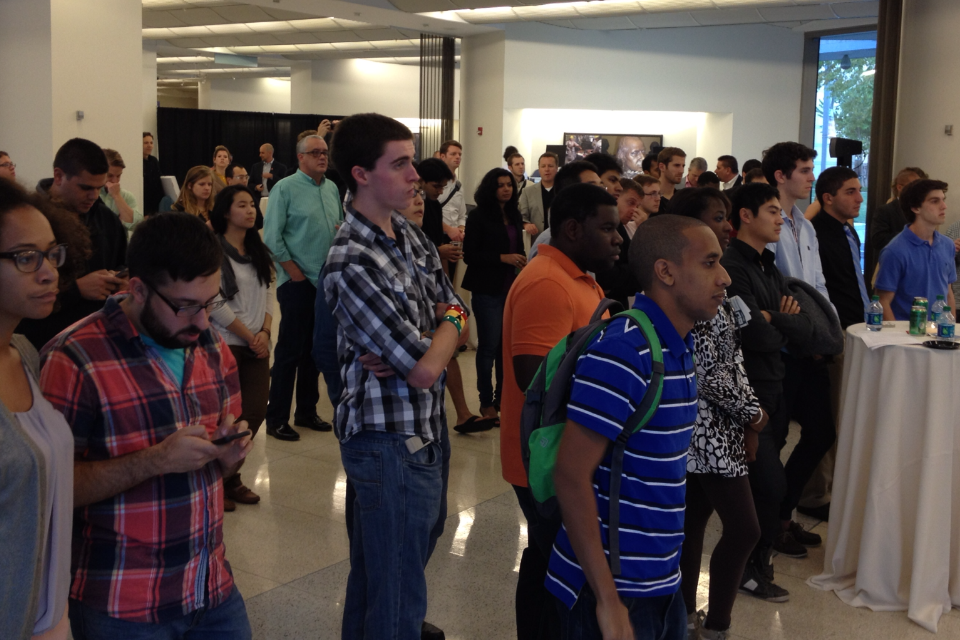In the last decade, Philadelphia’s notorious brain drain has slowed. In that time, a grassroots network of entrepreneurs and technologists have built a supportive ecosystem that has advanced enough that more established institutions are joining in. So what’s next?
Some are working on connecting those two developments, by broadening the awareness among the students at the region’s colleges and universities of those changes. That way any young person new to Philadelphia with interest in technology or entrepreneurship can’t miss that there is activity here.
There are already early successes building, but more needs to be done. Call that the backdrop for last week’s Start, Stay, Grow event, put on, in curious community fashion, by an ad hoc and diffuse committee of representatives and organizations, including, full disclosure, this reporter and Technical.ly Philly.
More than 100 mostly young people, from Drexel and Penn, Swarthmore and Haverford, St. Joe’s, Villanova, the Community College of Philadelphia and more — even travelers from Lehigh and Penn State — came to the National Constitution Center, which played host because the federal government shutdown closed the Independence Visitor Center, to hear from a host of community leaders.
Credit the soft pretzels and sodas to sponsors like Artisan Mobile, First Round Capital and Philly Startup Leaders and tip of the hat for the event coming together because of that committee, which first met months ago, including Yuriy Porytko, behind new early-stage firm SmartInvest, Danielle Cohn of the PHL Convention and Visitors Bureau, Jeff Friedman of the city, Jennifer Devor of Campus Philly, the organizers of campus tech group nvigor and others, including many of the speakers.
Watch a wrap video from Philly In Focus here.
http://c.brightcove.com/services/viewer/federated_f9?isVid=1&isUI=1
Between two sessions of student mingling and questions, here is what those in attendance heard, after a bit of an introduction and recent Philly tech history review by this reporter:
- Your college has entrepreneurship programs and we can help you find them: Deborah Diamond, the executive direct of Campus Philly, which has a growing tech interest, spoke about her organization’s work.
- There are free community resources that welcome young entrepreneurs: Artisan CEO and outgoing Philly Startup Leaders Bob Moul, who plugged PSL, its listserv and events, also rattled off the growing list of entrepreneurship events in Philly.
- Physical hubs of innovation represent opportunities to be inspired: Jeanne Mell of the 50-year old incubator University Science Center and Michael Maher of Center City coworking space Benjamin’s Desk introduced their organizations and Maher highlighted the variety of other efforts, including places like Indy Hall, Venturef0rth and others.
- The intersection of public-private partnership is changing how business gets done in Philadelphia: Paul Wright of Comcast shared the origin story of OpenAccessPhilly, the civic action stakeholder group he cofounded, and its involvement in open data and, as Wright so often says, “the free flow of information.”
- You have access to early stage capital: Isaac Sukin, a Wharton student and one of the board members of the Dorm Room Fund college investment effort backed by First Round Capital, introduced that program, setting up the reminder that from angel groups to an array of growing venture firms, there is money to be had if your idea is serious enough.
- Entrepreneurship and mission are particularly suited to work together in Philadelphia: Brigitte Daniel, the heir to the Wilco Electronics cable provider who has gone out on her own to launch edtech venture edIQ, introduced the idea of and network for social entrepreneurship in Philadelphia.
- Education technology is one example of an innovation sector that has specific resources for it here: Cat McManus of Penn’s Graduate School of Education spoke about her work and recalled why her program’s director thinks Philadelphia could be at the heart of one of the world’s leading corridor for changes in education.
- There is precedent for launching technology businesses that last while in college in Philadelphia: Darren Hill, the cofounder of Old City ecommerce company Weblinc, shared his story of launching the firm in 1994 from Kelly Hall Room 501 at Drexel University and now has more than 80 employees.
- College entrepreneurs and technologists have a place in Philadelphia: In something of a testimony, the event concluded with Abhiroop Das, the bright and polite Drexel student and cofounder of nvigor, a cross-campus group aimed at cultivating student connections to the region’s tech ecosystem. Das spoke about his experience finding and falling for technology in Philadelphia.
Though most certainly not the most important detail, for an event focused on being a first impression of Philadelphia tech entrepreneurship, it’s valuable to look at not only the variety of subject matters the speakers addressed, but also the signaling they represented to students: of 10 speakers, four were women and three were non-white.
It’s also worth noting how many and how hungrily students approached speakers afterward, often expressing surprise by the kind of community infrastructure already in place for the work many of them were excited to do.
It was a good start, but as the city’s Friedman told Technically Philly after the event, “there are a lot more students who need to discover what their friends found tonight.”
Before you go...
Please consider supporting Technical.ly to keep our independent journalism strong. Unlike most business-focused media outlets, we don’t have a paywall. Instead, we count on your personal and organizational support.
3 ways to support our work:- Contribute to the Journalism Fund. Charitable giving ensures our information remains free and accessible for residents to discover workforce programs and entrepreneurship pathways. This includes philanthropic grants and individual tax-deductible donations from readers like you.
- Use our Preferred Partners. Our directory of vetted providers offers high-quality recommendations for services our readers need, and each referral supports our journalism.
- Use our services. If you need entrepreneurs and tech leaders to buy your services, are seeking technologists to hire or want more professionals to know about your ecosystem, Technical.ly has the biggest and most engaged audience in the mid-Atlantic. We help companies tell their stories and answer big questions to meet and serve our community.
Join our growing Slack community
Join 5,000 tech professionals and entrepreneurs in our community Slack today!






